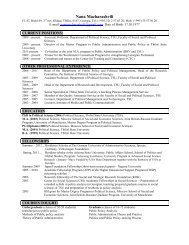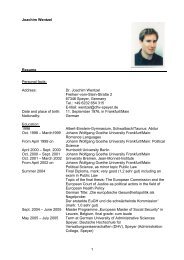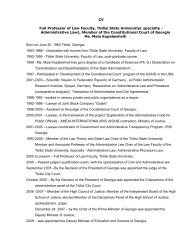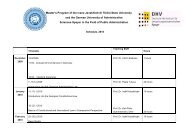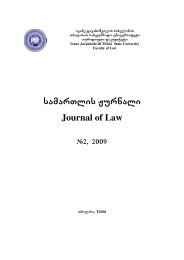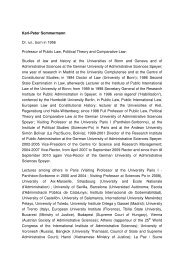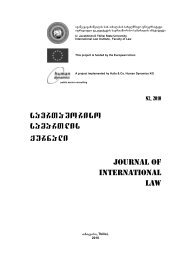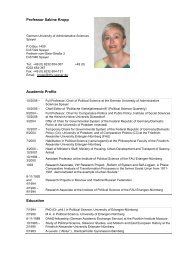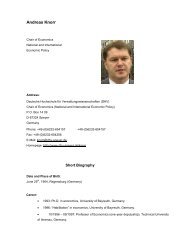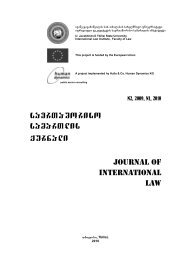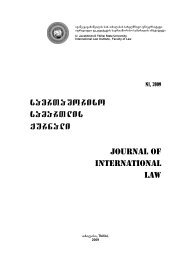Untitled
Untitled
Untitled
You also want an ePaper? Increase the reach of your titles
YUMPU automatically turns print PDFs into web optimized ePapers that Google loves.
K. KHUTSISHVILI, SHALL PROTECTION OF SOVEREIGN IMMUNITIES SUPERSEDE PROTECTION...<br />
consideration: Pinochet case is recognized as<br />
the first – and precedent creating case – allowing<br />
exercise of jurisdiction of a national<br />
court, not having any nexus with the perpetrated<br />
crimes and not recognizing the immunity<br />
of a former head of state in relation to international<br />
crimes committed by him when in office<br />
as a head of state. The criminal action<br />
considered by the House of Lords as the one<br />
not fitting the list of actions over which the<br />
sovereign immunity must still be claimed, is<br />
torture, an international crime, an act so heinous<br />
that punishment of a perpetrator may be<br />
allowed under universal jurisdiction. Still, the<br />
decision of the House of Lords was very limited<br />
and reserved 66 . It can still be considered<br />
as a state-centered decision, not the human<br />
rights oriented one. “Although at first glance<br />
it appears as though the judges did not respect<br />
Chile’s sovereignty because they denied<br />
immunity without any explicit waiver of immunity,<br />
each judge was cognizant of the sovereignty<br />
question and justified the lack of the<br />
immunity defense on the basis that Chile had<br />
signed it away.” 67 As argued elsewhere, “the<br />
Pinochet decision speak[s] to the continued<br />
ascendancy of politics and state sovereignty<br />
in the current international legal order”. 68<br />
At any rate, the case is interesting for the<br />
purposes of this essay, as the majority in the<br />
First Pinochet Case concluded that “international<br />
law has made plain that certain types of conduct,<br />
including torture and hostage-taking, are<br />
not acceptable conduct on the part of anyone.<br />
This applies as much to heads of state,<br />
or even more so, as it does to everyone else;<br />
the contrary conclusion would make a mockery<br />
of international law.” 69 The six to one majority<br />
of the House of Lords in the Third Pinochet<br />
Case held that Pinochet could not have<br />
claimed immunity for actions perpetrated<br />
against the Torture Convention. 70<br />
Peter Carter puts a question: “Can it be<br />
said that as a result of the Pinochet decision<br />
there has now emerged a peremptory law of<br />
general international law inconsistent with diplomatic<br />
immunities contained in any treaties<br />
insofar as they might appear to extend to international<br />
crimes against human rights” and<br />
his answer is extremely concise: “Possibly”. 71<br />
As Christine M. Chinkin aptly mentions,<br />
“[d]enial of the immunity … claimed for a<br />
former head of state for official acts of torture<br />
represented a choice between two visions of<br />
international law: a horizontal system based<br />
upon the sovereign equality of states and a<br />
vertical system that upholds norms of jus cogens<br />
such as those guaranteeing fundamental<br />
human rights. The choice was not easy”. 72<br />
As the issue of sovereign immunities is a<br />
fairly controversial issue, there are different<br />
views on the matter as well. “Writing critically<br />
of the Lords’ decision in the Pinochet case,<br />
Henry Kissinger talks of the tyranny of judges<br />
replacing that of government, of prosecutorial<br />
discretion without accountability and warns<br />
that ‘historically the dictatorship of the virtuous<br />
has often led to inquisitions and witch hunts’”. 73<br />
When discussing yet another interesting<br />
case for our purposes – a case of Yerodia 74 ,<br />
Yang notes that “[w]hile affirming absolute<br />
immunity from criminal jurisdiction and inviolability<br />
enjoyed by incumbent Ministers for<br />
Foreign Affairs, the Court avoided taking a<br />
position on the legality of the purported exercise<br />
of universal jurisdiction by Belgium. However,<br />
since the Court approached the issue of<br />
immunity by assuming that Belgium had universal<br />
jurisdiction under international law, the<br />
case definitely shows that, in international law,<br />
universal jurisdiction is circumscribed by certain<br />
rules, notable among which is the rule of<br />
immunity.” 75 It has also been observed that<br />
“[t]he problemp is that there is a considerable<br />
uncertainty as to the present international law<br />
relating to Heads of State and Government.” 76<br />
This uncertainty needs to be solved in favour<br />
of human rights protection, making States to<br />
abandon their egoistic desires to protect themselves<br />
from prosecutions. Protection of human<br />
rights must be given a priority and this is especially<br />
so in relation to crimes, termed “international”.<br />
Therefore, a principle of prosecution<br />
for international crimes must be recognized<br />
as a principle coexisting with universal<br />
jurisdiction and all states must be entitled to<br />
exercise their jurisdiction over perpetrators of<br />
such crimes, disregarding the status of the<br />
perpetrator or any nexus of the crime with the<br />
prosecuting state. Unfortunately, the situation<br />
is not like this yet 77 , and as Fox notes, “absolute<br />
immunity from criminal jurisdiction and<br />
personal inviolability afforded to serving Heads<br />
of State in office … appear to be generally in<br />
line with current state practice”. 78 Deriving from<br />
the judgment of the ICJ, “the immunities under<br />
customary international law, including<br />
those of Ministers for Foreign Affairs, remain<br />
73



